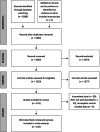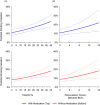Variability and effectiveness of comparator group interventions in smoking cessation trials: a systematic review and meta-analysis
- PMID: 32043675
- PMCID: PMC7496125
- DOI: 10.1111/add.14969
Variability and effectiveness of comparator group interventions in smoking cessation trials: a systematic review and meta-analysis
Abstract
Aims: To examine variability and effectiveness of interventions provided to comparator (control) groups in smoking cessation trials.
Methods: Systematic review with meta-analysis of randomized controlled trials (RCTs) of behavioral interventions for smoking cessation, with or without stop-smoking medication. We searched the Cochrane Tobacco Addiction Group Specialized Register for RCTs with objective outcomes measured at ≥ 6 months. Study authors were contacted to obtain comprehensive descriptions of their comparator interventions. Meta-regression analyses examined the relationships of smoking cessation rates with stop-smoking medication and behavior change techniques.
Results: One hundred and four of 142 eligible comparator groups (n = 23 706) had complete data and were included in analyses. There was considerable variability in the number of behavior change techniques delivered [mean = 15.97, standard deviation (SD) = 13.54, range = 0-45] and the provision of smoking cessation medication (43% of groups received medication) throughout and within categories of comparator groups (e.g. usual care, brief advice). Higher smoking cessation rates were predicted by provision of medication [B = 0.334, 95% confidence interval (CI) = 0.030-0.638, P = 0.031] and number of behavior change techniques included (B = 0.020, 95% CI = 0.008-0.032, P < 0.001). Modelled cessation rates in comparator groups that received the most intensive support were 15 percentage points higher than those that received the least (23 versus 8%).
Conclusions: Interventions delivered to comparator groups in smoking cessation randomized controlled trials vary considerably in content, and cessation rates are strongly predicted by stop-smoking medication and number of behavior change techniques delivered.
Keywords: Behavior change techniques; comparator group; control group; meta-analysis; meta-regression; smoking cessation; systematic review.
© 2020 The Authors. Addiction published by John Wiley & Sons Ltd on behalf of Society for the Study of Addiction.
Figures


References
-
- Goetzel R. Z., Anderson D. R., Whitmer R. W., Ozminkowski R. J., Dunn R. L., Wasserman J. et al The relationship between modifiable health risks and health care expenditures: an analysis of the multi‐employer HERO health risk and cost database. J Occup Environ Med 1998; 40: 843–854; Available at: ncbi.nlm.nih.gov/pubmed/9800168 (accessed: 29 January 2020). - PubMed
-
- Gakidou E., Afshin A., Abajobir A. A., Abate K. H., Abbafati C., Abbas K. M. et al Global, regional, and national comparative risk assessment of 84 behavioral, environmental and occupational, and metabolic risks or clusters of risks, 1990–2016: a systematic analysis for the global burden of disease study 2016. Lancet 2017; 390: 1345–1422. - PMC - PubMed
-
- Lindson‐Hawley N., Thompson T. P., Begh R. Motivational interviewing for smoking cessation. Cochrane Database Syst Rev 2015; 3: CD006936. - PubMed
-
- Lancaster T., Stead L. F. Individual behavioral counselling for smoking cessation. Cochrane Database Syst Rev 2017; 3: CD001292. - PubMed
-
- Stead L. F., Carroll A. J., Lancaster T. Group behavior therapy programmes for smoking cessation. Cochrane Database Syst Rev 2017; 3: CD001007. - PubMed
Publication types
MeSH terms
Substances
Grants and funding
LinkOut - more resources
Full Text Sources
Medical

